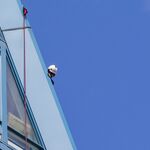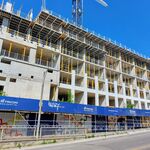How do some of you sleep at night, spreading so many fallacies throughout this forum?
Like streetcars don't make clanging ruckus every time they intersect another streetcar path or a thunderous roar so loud it's difficult to listen one's iPod or have a phone conversation. And don't forget how screechy they get while making turns and the unpleasant vibrations passengers have to endure while on-board. In short, people in glass houses shouldn't be throwing stones.
LRTs are not faster than buses. It's the other things being done like having a ROW and wider stop separation that will determine trip times - independent of whether you have an LRT or buses. Here's a good article from a transit planner:
http://www.humantransit.org/2009/07/streetcars-an-inconvenient-truth.html. Newer model buses are now coming equipped with reduced fuel consumption, reduced emissions, and lower operating and life cycle costs.
Also do the math. Over 80% of the TTC's vehicular fleet is buses. Buses move over 1.2 million passengers per day, almost all feeding directly into the subway system. Without buses the whole system would implode. And while LRT has a carrying capacity of 200-10,000 pphpd; Busway (i.e. buses running in a private ROW) can acheive 400-
12,000 pphpd according to the
Advanced Transit Association. We have the unique oppurtunity here in Toronto to acheive such levels of service by putting buses through the Richview-Cherrywood Hydro Corridor, partitioned off sections of Kingston Rd and Finch Ave, and the use of public lands beside Highways 401 and 427. Rapid transit doesn't have to be underground or on rails in order to be effective.
Investing in ANY rail is a major capital expenditure. We can thank Miller and company for frightening us with scary COST figures. But Global cities don't get big by thinking small. To wit: What about the increased financial BENEFITS of building a subway - why does no one offer statistical estimates of that? Sure, subways will incur a one-time $200-million/km construction premium over LRT, let's say, as well as higher annual operations costs. But how do the benefits of increased land value, decreased road congestion, increased TTC revenue, increased economic savings for GTA business stack up for the 100-year lifespan of the subway? Basically, if a subway lasts 100 years (vs 30 for LRT) the net-present value of benefits doesn't only has to be over $2-million dollars net per year/per kilometre of subway in order for the subway spending to worth more than the LRT. Subways pay for themselves. Always have always will. Recent example: Sheppard Stubway's 1 Billion Dollar cost has resulted in 2 Billion Dollars of development and is still going strong. In the 100+ years of Red Rocket service downtown, much of it still runs through urban slums and stable neighbourhoods adverse to redevelopment.




